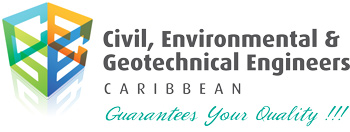In August 2016 CEGE has started enthusiastically on the expansion site of the existing wind farm at Tera Kora, Curaçao. Commissioned by NuCuraçao Windparken we provided a diversity of quality control testings for this large-scale project. After conducting of more than 300 density measurements and testing and assembly of the anchors, the pouring of the foundations could be started with.
To guarantee the quality of concrete it is to be tested for various parameters. The compressive strength of concrete cubes is being tested after 3, 7, 14, 28 and 56 days of hardening. A temperature gradient between the core and the outer surface of the poured concrete is also very important. The temperature inside the poured construction can be monitored using a thermal computer. In the period November 2016 – February 2017 five foundations of the new turbines were completed.
In the meantime, the Vestas turbines have arrived at the port of Willemstad. Next weekend transport will commence and the assembly can begin! It is expected that the expansion will be fully operational in July 2017.
